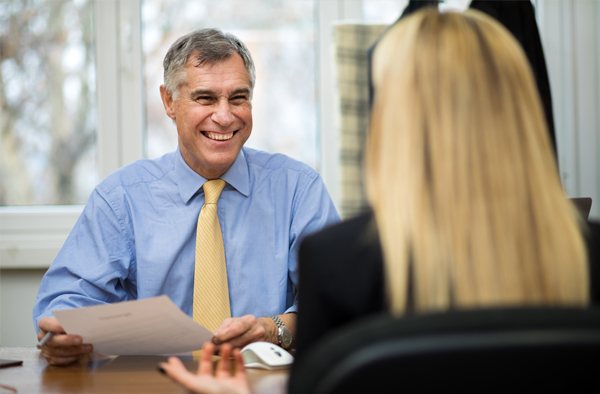Your shopping cart is currently empty.
Body language for GP Interviews

Interview skills and communication skills are not just about speech techniques and structures. You may have come across studies or statistics which state that up to 60% of the impression that you make is through your body language. Whatever the reality behind this statement, it is undoubtable that the way you dress and behave at your GP interview will strongly influence the person who is looking at you, even if it is subconsciously.
To make a strong impression at your GP interview, there are a number of accepted rules that you should reflect upon and adopt:
Worried about your GP interview?
Then book onto one of our popular interview coaching sessions for GP posts
Tips
Choose a good position within the room
At your GP interview, you will normally be directed to a specific seat (i.e. you will have no choice). However, interviews can often be conducted in oversized environments (e.g. a meeting room with a table for 8 when there are only 3 of you). Make sure you choose a seat which enables you to see everyone involved without having to rotate your head exaggeratedly. In most cases, it may be best to hover around to see which chairs the interviewers are aiming for before making your selection.
If there is a window, choose a chair that faces it so that your face is lit from the front, unless there is good lighting all around. If you turn your back to the window, the interviewers may see you in sepia!

Maintain a good posture
If you are being interviewed at a table, make sure that you are not too close to the table. As a rule of thumb, if you let your arms fall loosely on the table in front of you, they should fall with your elbows slightly outside of the table. If you elbows are actually on the table then you are too close. If your elbows are more than a few inches away (or you have to lean forward a lot to put your hands on the table) then you are too far away. For most people, the ideal distance between chest and table is about 4 inches.
Plant both feet onto the ground so that you remain stable and put your hands on the table (people who place their hands below the table come across as having something to hide). Keep yourself upright, with a slight slant forward and relax our shoulders. Don't slouch If there is no table, (or only a low table) then simply rest your hands on your lap.

Don't be afraid to "own the space"
Just because you are under observation, it does not mean that you should recoil into a corner. It is okay to stand or sit with your legs slightly apart, and in fact, it is a sign of confidence (don't overdo it though, it would become indecent!).

Limit your hand and arm movements
It is perfectly okay to move your arms and hands around, and if that is the way that you normally behave then don't try to become someone else. Your personality and enthusiasm are as important as everything else. However make sure that such movements do not become distracting and do not take the attention from your face. To achieve this, make sure that you don't overdo it and that your movements are limited to the corridor in front of you, never higher than your chest, and never under the table. If there is no table, you can let your hands go as far down as your lap. If your hands go outside towards the left or right, your interviewers will follow them and may stop concentrating on you. If your hands go over chest level, you will most likely obscure your lips or eyes. If you have a tendency to fidget in a very distracting manner, intertwine your fingers and rest your hands on the table. Whatever you do, never cross your arms. It will make you look unreceptive, guarded and lacking in confidence.

Smile
A nervous smile is better than no smile at all. No one wants to recruit a grumpy person or someone who looks like they are not enjoying themselves.
Good interviewers will understand that you may be nervous and will make attempts to put you at your ease (even if they are not as good at it as they think they are!). Make sure you reward their efforts with an easy smile. No need to overdo it. It is not a contest for straight teeth, but simply a reasonable attempt to engage with them. Smile lightly also when you are being introduced to each member of your panel. This is important to create a rapport.
It is also perfectly acceptable to laugh if it warrants it (but avoid making jokes just for the sake of introducing a laugh into the conversation because your interviewers may not share your sense of humour!). You'll probably end up being the only one laughing, and you'll soon be crying.

Maintain eye contact
If you don't make eye contact, you will come across as evasive and insecure. If you stare at people too much, you will make them insecure. There are two situations here: either you are being interviewed by just one person, in which case you will have no choice but to look at them all the time; or you are being interviewed by more than one person. If this is the case, then look mostly at the person who is asking you the question, and occasionally glance aside to involve the others (they will be grateful that you are trying to involve them into the conversation even if they have not asked that particular question). Beware of the props
If you have a pen with you, avoid fiddling with it. It will only end up flying in the wrong direction. Similarly, if they offer you a drink (tea, coffee, water, etc), make sure that you can cope with it and that won't need to go to the toilet or start crossing your legs half way through the interview. Generally you should avoid picking up any drink if you can. Other than the fact that it may end up down your shirt or on your lap, the movement of the water in a glass that you have just picked up will reveal just how nervous you are.

Mirror the interviewer's behaviour
Mirroring (i.e. acting similarly) to someone is an indication that there is a connection. It would usually happen normally but you may be able to influence it too, if only to give the interviewer that impression.
For example, if the interviewer is sitting back then you may want to sit back a little too; if he leans forward, you may lean forward to. Be careful not to overdo it though and do not mirror instantly, otherwise it will look like some kind of cartoon sketch.

And relax...
At the end of the day, you can't spend all your energy focusing on body language. There is no point having a brilliant body language if you are talking rubbish. Bearing in mind that body language is a reflection of your level of confidence; it is important that you build your confidence up first through good preparation and then go to the interview relaxed. You will be surprised of how much of the above you can do naturally.

Nervous about how you might come across at a GP interview?
We can help you with our regular one-to-one interview coaching service for GP posts
